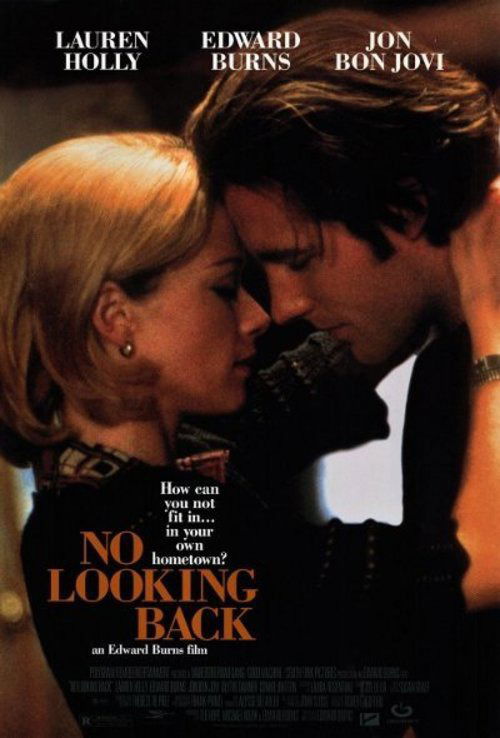"Commitment in the 90s"

| None | Light | Moderate | Heavy | |
|---|---|---|---|---|
| Language | ||||
| Violence | ||||
| Sex | ||||
| Nudity |
What You Need To Know:
In NO LOOKING BACK, Claudia, played by Lauren Holly, is an attractive woman in her early thirties who lives in a working class community in the New York suburbs. When her ex-boyfriend Charlie, played by Edward Burns, comes back and courts her after three years, Claudia re-evaluates her life and the choices she has made in light of her reliable, hardworking, but boring live-in boyfriend Michael’s (Jon Bon Jovi) desire to get married. Charlie appeals to the impulsive dreamer inside of her, and she allows herself to be persuaded to join him starting a new life somewhere else. NO LOOKING BACK reflects 1990’s American society’s attitude toward commitment. It portrays commitment as a set of feelings which vacillate, rather than a choice.
The acting in this movie is powerful. Lauren Holly gives one of her best performances to date as Claudia. Although its many obscenities mar its otherwise powerful emotional impact, NO LOOKING BACK raises important issues and questions which are very relevant for moral audiences to explore. To what or to Whom can hurt people turn for resources and solutions to their relational problems? In this sense, NO LOOKING BACK disappoints viewers because no one in the movie looks to God for guidance and wisdom
Content:
(Ro, LLL, S, M) Romantic worldview with moral elements; 46 obscenities and 2 profanities; no violence; implied & tastefully depicted fornication; no nudity; and, drinking & smoking.
More Detail:
In NO LOOKING BACK, Edward Burns, who won the Grand Jury Prize at the 1995 Sundance Film Festival for THE BROTHERS MCMULLEN, once again yields a thought-provoking movie in this romantic drama. NO LOOKING BACK centers around Claudia (Lauren Holly), an attractive waitress in her early 30s who lives in a working class community in the New York suburbs and lives with her reliable and hardworking live-in boyfriend, Michael (Jon Bon Jovi). Her life is stable, but boring. Hanging out at the local bar and drinking with friends is their only source of entertainment and recreation, and their week-in, week-out routine rarely seems to alter.
However, Claudia begins to re-evaluate her life and the choices she has made when her ex-boyfriend, Charlie (Edward Burns), comes back into town after having been gone three years. Charlie broke her heart when he just took off and left town without saying anything to anyone. Immature and impulsive, Charlie wants to go back to the way things were and cannot accept the fact that Claudia is planning to marry Michael. So he finds creative ways to pursue her.
At first, she resists, but, by appealing to the impulsive dreamer inside of her, Charlie persuades her to join him in leaving town and starting a new life somewhere else. She realizes that she feels stuck in her present circumstances and berates Michael for the boring, predictable weekend evenings he proposes she spend with him and his family. Charlie prevails on Claudia to join him for a night of passion at a local motel, but when she comes home at 5 a.m., Michael waits at the kitchen table in despair. He confronts her, and she reluctantly admits having spent the night with Charlie. Angrily, Michael tells Claudia to pack her things and leave his house.
Compounding Claudia’s confusion surrounding her life are her mother’s severe episodes of depression which result from her husband’s having left her for another woman. In a scene pregnant with meaning, her mother tells Claudia: “You were always more like your father.” Indeed, viewers realize that Claudia is doing to Michael what her father did to her and her family.
NO LOOKING BACK brings up the issue of commitment in the 1990s. In a scene in which Claudia is discussing with Michael her mother’s depression over her father’s leaving, she says “He doesn’t love her anymore. What’s he supposed to do? Be miserable?” Her rationalizing her father’s abandonment contrasts directly with Michael’s difficulty in understanding how her father could have left her mother. In this sense, Claudia’s viewpoint reflects 1990’s American society’s attitude toward commitment. In NO LOOKING BACK, commitment is portrayed as a set of feelings which vacillate, rather than choices one makes. Unfortunately, NO LOOKING BACK does not portray any positive outcomes for people who do choose to stay committed to a relationship, nor does it offer other resources people can seek to gain perspective on their situations, such as counseling or prayer.
NO LOOKING BACK raises the question of what taking care of oneself really means. In this movie, viewers get the impression that looking out for oneself is life’s primary objective, rather than to love God and neighbor ahead of self.
The acting in this movie is powerful. Edward Burns plays Charlie’s character in a natural and realistic manner. Director and producer as well, Burns creatively chose the cold, gray days of winter to set the movie’s tone. Lauren Holly, last seen opposite Greg Kinnear in A SMILE LIKE YOURS, gives one of her best performances to date as Claudia. Jon Bon Jovi is quite convincing and believable as the loyal and stable Michael.
Although its many obscenities mar its otherwise powerful emotional impact, NO LOOKING BACK raises important issues and questions which are very relevant for moral audiences to explore. Are continual drinking and smoking valid ways of coping with life? Can trust be re-established in a relationship once it has been broken? To what or to Whom can hurt people turn for resources and solutions to their relational problems? In this sense, NO LOOKING BACK disappoints viewers because no one in the movie looks to God for guidance and wisdom, and yet the Bible says that He longs to meet the needs of His people with His infinite love.



 - Content:
- Content: 



